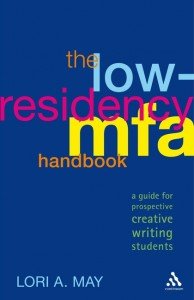
Today’s guest post is by Lori A. May (@loriamay) and is adapted from The Low-Residency MFA Handbook: A Guide for Prospective Creative Writing Students (Continuum, 2011).
It’s hard not to notice the proliferation of MFA programs, particularly those structured with a low-residency model. Each year, more new programs are introduced and there is currently no sign of such growth coming to a halt. Perhaps you have also noticed how overwhelming the research process can be. What makes these programs unique? How do you know if this type of program is right for you? While The Low-Residency MFA Handbook: A Guide for Prospective Creative Writing Students was designed to answer all of these questions and more, here is a quick overview.
The Basics
Much like a traditional, full-residency creative writing MFA, low-residency programs generally take two or three years to complete. However, instead of spending each day on campus, low-residency students visit campus for only a small portion of the year. Many programs get together for two residencies, while others meet once annually. Ranging from one to two weeks in duration, each residency brings together students, faculty, guest speakers, and directors for an intense conference-like setting.
During each residency, students participate in a number of workshops, craft and literature seminars, professional development sessions, and one-on-one meetings with faculty. Creative writing MFAs generally culminate in a book-length thesis, and low-residency students will set suitable writing goals with their thesis supervisors.
Outside of each residency, the rest of the graduate program is completed through any combination of distance studies. Some programs pair students with a mentor to work one-on-one for the duration of one term, often alternating faculty for each of the four to six home-based semesters. Other programs use online classrooms to emulate a campus-based workshop experience. There are also a few hybrid study formats, wherein students work through a combination of one-on-one faculty mentorship and distance classes.
What to Expect
While each program is unique in its approach, students have opportunities to pursue fiction, nonfiction, poetry, screenwriting, children’s writing, and a number of cross-genre options. While many programs encourage literary esthetics, others are open to exploring commercial and popular fiction and films. You can be sure there is at least one program that offers your desired mode and scope of study, no matter your personal interest.
The goal of any low-residency creative writing MFA program is to provide opportunities for students to explore the writing craft. Each student is encouraged to immerse him or herself in the community provided, comprised of fellow students, instructors, and visiting writers. The programs aim to equip student writers with a support system, with focused time and attention on developing the craft and working on a substantial body of work.
The main attraction to enrolling in a low-residency program is the ability to obtain a graduate degree while leading your usual lifestyle. The low-residency format allows writers to tend to life’s responsibilities and joys, including family, work, and friends based in the student’s current location. There is no need to pack up the family and move, and no need to quit the day job. Apart from the residencies, you create your own schedule and complete assignments when it suits you. As such, low-residency programs offer increased flexibility for writers who desire the graduate degree but are unable, or uninterested, in making major life changes.
Real-Life Experience
While all creative writing MFAs provide challenging learning experiences, the low-residency format requires a particular amount of self-discipline. Students are accountable for their own success, perhaps more so than full-residency programs, as there are no traditional classes to attend. No one will notice if you stay in your pajamas and watch television all day. No one will reprimand you if you check your social media status updates every ten minutes. Deadlines come quick, though, and others will notice if you do not submit your assignments during the agreed upon timeline.
While writers are often naturally independent, there is a great sense of community available through online discussions, e-mails, and phone calls, and regular correspondence with faculty. Students and instructors can connect at any time of day and from all across the country and beyond. By relying on distance communication, students are that much more accessible to one another at all hours and, in turn, the residencies often feel like a reunion amongst close friends.
Do Writers Need an MFA?
No. That’s the easy answer. If you are looking to improve your craft, there are countless opportunities to do so; community workshops, festivals, conferences, and continuing education courses are just a few of the ways you can work on your craft. Then there is the old-fashioned way: just write.
An MFA program is merely one vehicle for moving a writer’s career forward, but it is certainly not the only path to success. A dedicated, ambitious writer will find personal success one way or another. It’s up to you to decide whether a graduate degree in creative writing is ideal for you and your goals.
 If you’re considering a low-residency MFA, don’t miss Lori A. May’s comprehensive guide.
If you’re considering a low-residency MFA, don’t miss Lori A. May’s comprehensive guide.
Lori A. May writes across the genres, road-trips half the year, and drinks copious amounts of coffee. Her books include Square Feet (Accents, 2014) and The Low-Residency MFA Handbook: A Guide for Prospective Creative Writing Students (Continuum/ Bloomsbury, 2011). Her writing has also been in publications such as The Atlantic, Brevity, Midwestern Gothic, and Writer’s Digest. Lori teaches in the University of King’s College creative nonfiction MFA program and is a frequent guest speaker at writing conferences and residencies across North America. Visit her website at loriamay.com.

This was a great overview. I know a couple of people who’ve done this and they’ve been delighted with the programs and how much they learned. I think they’ve come out better writers. The only problem is, it’s not necessarily the “best” writer who gets the deal or sells the most. It’s usually the one with the best story, and no one can teach that.
Although I won’t be getting an MFA, this was a good informational article. I have an MA in communication and I am a full-time college instructor. That must count for something.
FYI: By the way, your “Blog” page button is currently bringing up an error and not connecting readers to the blog
Yikes, thanks for letting me know. Now fixed.
[…] 6. Ever wondered if you should get an MFA to improve your writing? Read The Low-Residency MFA. […]
Anyone can learn to write. All you need is a notebook, a pen, and a library card. The important question is do these programs lead to teaching jobs?